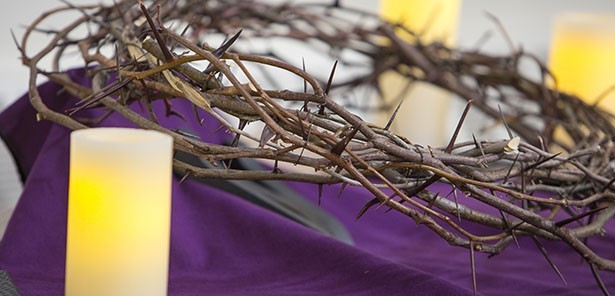Four ideas to celebrate ‘Holywins’ with your family on the eve of All Saints
Denver Newsroom, Oct 29, 2022 / 06:00 am
The celebration of “Holywins” (“Holiness wins“), is an initiative that originated in Paris in 2002 with the aim of celebrating the eve of All Saints on Oct. 31 in a Christian way. Over time, this Catholic celebration spread to the rest of the world.
On that day, parishes and Catholic communities gather to celebrate Mass, participate in eucharistic adoration and prayer meetings, and take part in recreational activities to encourage the participation of children, young people, and their families.
At the celebrations, it’s customary for children to dress up as their favorite saints, to discuss the exemplary lives of the saints, and to remind the children of the call to sainthood. In addition, games are usually played, lively songs are sung, and food and sweets are shared.
The Diocese of Alcalá de Henares in Spain has been putting on a complete Holywins program for children and youths since 2009 and includes games, workshops, a procession to the cathedral, activities for the evening, and eucharistic adoration.
Here are some ideas to celebrate Holywins with your family.
1. Dress up as your favorite saints.
A large investment isn’t needed to make a costume, and with the help of some fabrics or household items, a good characterization can be achieved.
For example, to dress as St. Catherine of Siena, all that is needed is a long white or cream-colored dress that represents the habit of the Dominican order and a black cloth in the form of a veil used by nuns to cover their heads. In addition, a crown of dry branches can be made for the head and a cross and a small bouquet of lilies can be carried in the hand.
To dress up as St. Rose of Lima, you can use the same habit used for St. Catherine of Siena, only changing the crown of dry branches for one of red roses.
To dress up as St. Juan Diego, all that is needed is a large white or cream-colored blanket or sheet to wrap around the body and on the front can be placed an image of Our Lady of Guadalupe with some red roses at her feet.
To represent St. Dominic Savio, the patron saint of children’s choirs, you only need brown pants, a green jacket, a white shirt, and a bow tie. To dress as St. Ignatius of Loyola a black robe is all that is needed; for St. Francis of Assisi, a brown robe.
You can find more ideas for costumes here.
2. Share themed foods and treats.
Every celebration is usually accompanied by food; take advantage of this day to cook with your family and prepare desserts alluding to the trade or activity the saint is the patron of, or with characteristic elements of your favorite saint. As you enjoy the meal, share with your family the story or anecdotes of the chosen saint or saints.
For example, for St. Juan Gualberto, the patron saint of parks and forest workers, you could make chocolate cupcakes decorated with white frosting and small trees made with chocolate or stretchy dough. In the case of St. Rose of Lima, you could make cupcakes with frosting in the shape of red roses.
For St. Anthony the Abbot, the patron saint of domestic animals, or St. Francis of Assisi, the patron saint of animals and environmentalists, you could make or buy cookies in the shape of animals or leaves or trees.
3. Come up with playful activities about the saints.
In addition to the prepared desserts, you could fill large containers or cups with candy with each one wrapped in a piece of paper that has some of the most famous quotes from the saints of your devotion written on them. You could also fill cups with candy and place a lollipop stick or a short stick inside with the image of a saint glued to it.
If you have pumpkins, you could draw a star or a cross on them and fill them with candy that has quotes from your favorite saints wrapped around them. In this way the scary faces that are typically carved on pumpkins will be avoided and a more Christian meaning will be given to this activity.
Later, you could tell the story of some saints or watch movies of saints as a family — perhaps animated ones for children — and then ask questions to see how much family members understood. With those who already know various stories of the saints, you could even play charades. Those who answer correctly can be rewarded with the candy.
You could also have the smallest children in your family make a dramatization or performance of the story, episode, or anecdote of one of their favorite saints. This activity could be more fun if they have a costume or something associated with the saint.
In addition, each member of the family could be encouraged to draw his or her favorite saint or make origami or crafts representing his or her patron saint or some characteristic element of the saint. Afterward, each member could explain why he or she chose that saint and share a favorite quote of the saint with the others.
4. Decorate your home altar and pray as a family.
First, set up a family altar in your home if you don’t have one. This is an excellent place to pray the rosary as a family, and this devotional practice is better done in community than individually.
Images of saints are often placed on altars for veneration and can also be very educational.
Remembering that this space in the home should be special and encourage recollection for prayer, take advantage of this special day and decorate it as a family with images of your favorite saints and flowers for the Virgin Mary, whether natural or made with paper using the origami technique.
Then, pray the rosary with your whole family, asking God for holiness for your family, and dedicate a prayer to the saint or saints of your devotion. Each family member could read a mystery of the rosary, and at the end everyone could sing a Marian hymn.
The concept of Holywins
For last year’s celebration of Holywins, the Diocese of Alcalá de Henares explained that “the phonetic similarity with the word ‘Halloween’ is not accidental, since Holywins seeks to help reinforce the Christian festival of All Saints in the face of [an] increasing” pagan influence on Halloween.
The diocese pointed out that although “Halloween means ‘All Hallows Eve’ in English, currently this celebration has no relation to the Christian faith. On the contrary, its way of approaching life and death, good and evil, is completely different from that of the Gospel of Christ and the tradition of his Church.”
Holywins is an initiative that seeks to encourage breaking with “the cult of death and the exaltation of the monstrous or ugly that it brings with it, since what is proper to Christians is to celebrate the triumph of life and promote beauty and [goodness],” the diocese said.
Holywins seeks to “convey the same message: life is beautiful and its goal is heaven, there are many who have already arrived and we are all called to share their happiness, since we can all be saints,” the diocese pointed out.
The diocese also noted that “with the costumes of the living dead that fill the streets of the cities on Oct. 31” for the celebration of Halloween, “more and more dioceses are joining the celebration of Holywins.”
“We Catholics want to return to this day its true meaning and celebrate all those who heroically followed Jesus Christ, with a luminous feast of All Saints that overflows with joy and hope,” it concluded.
This story was first published by ACI Prensa, CNA’s Spanish-language news partner. It has been translated and adapted by CNA.













